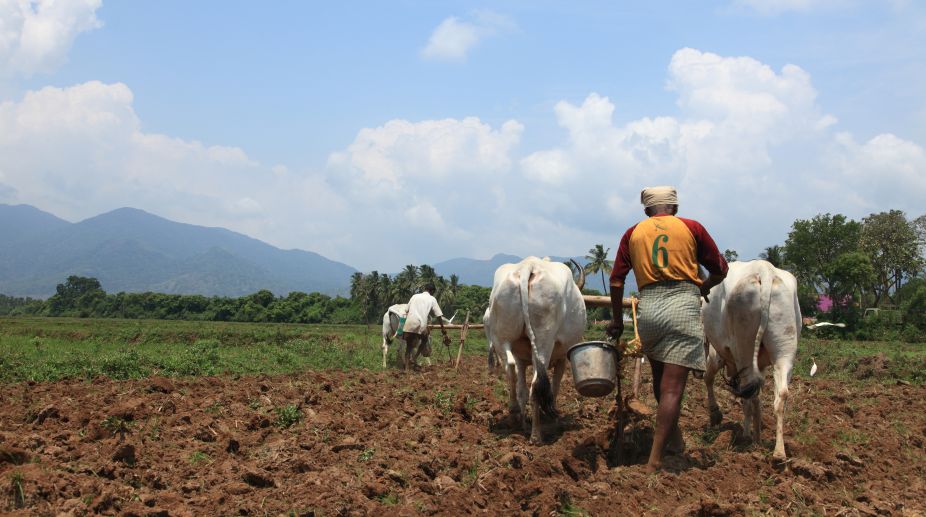With farmers’ economic welfare and infrastructure development constituting the core areas of Uttar Pradesh’s progress, the Yogi Adityanath government’s budget for fiscal 2018-2019 was presented in the Vidhan Sabha on Friday. The budget aims at ushering in a new phase of all-round development with its focus on welfare of all sections of society.
The budget size of Rs 4,28,384.52 crore is the biggest financial statement presented in the state so far, which is 11.4 per cent higher than the budget of the 2017-2018 financial year. The 2018-2019 budget includes new schemes worth Rs 14,341.89 crore.
Advertisement
Presenting the budget in the assembly, Finance Minister Rajesh Agarwal hoped that the government would be able to work towards providing better health services and education and create employment opportunities.
Along with rural and urban areas, poor and the farmers and women’s welfare, the government, he hoped, will be successful in taking the “sarv samaj” to the “golden era” (“swarnim kaal”). In his budget speech, Agarwal said a road map has been prepared for doubling farmers’ income by 2022, and added that the government is moving in that direction.
Later, addressing a press conference at the Tilak Hall after the presentation of the budget, Uttar Pradesh Chief Minister Yogi Adityanath said the budget had been formulated keeping in mind the welfare of the “kisan, youth ,women and village”.
He spoke about the new schemes started by his government and which find a place in the budget. These include the ‘One district one product’ , the ‘Mukhya Mantri Rozgar Yojana’, the ‘Chief Minister Helpline’ and three Metro projects of Kanpur, Agra and Meerut, Adityanath said.
The chief minister also spoke about the thrust to spiritual tourism and the budgetary allocation for Kumbh Mela, 2019. Adityanath was hopeful that the ‘Investors’ Summit 2018′ on 21 and 22 February will pull Uttar Pradesh from the shackles of a BIMARU state to that of a “swasth” (health) state.
Since the focus of the BJP government is on industrial and infrastructure development, a budgetary provision of Rs 600 crore has been made for the Industrial Development Policy, 2012 and Rs 500 crore for the New Industrial Policy.
Keeping in tune with the chief minister’s promise of linking the backward Bundelkhand region with other parts, a provision of Rs 650 crore has been made in the budget for starting the initial works of the Bundelkhand Expressway project.
Likewise, a provision of Rs 550 crore has been made for the initial works of the Gorakhpur Link Expressway project. Another Rs 1000 crore has been earmarked for the construction of Purvanchal Expressway starting from Ballia in eastern Uttar Pradesh. A budgetary provision of Rs 500 crore has been made for the Agra-Lucknow Expressway.
A budgetary allocation of Rs 11,343 crore has been made for the construction of roads and Rs 1817 crore for the construction of bridges. While a target of constructing 5,000 ponds has been fixed under the ‘Khet -Talaab Yojana’ in Bundelkhand, on the irrigation front, Rs 1,614 crore has been proposed for the Saryu Canal project, which has been pending since 1976, Rs 741 crore for the Arjun Sahayak yojana and Rs 1701 crore for the Madhya Ganga Canal water project.
In the energy sector, a budgetary provision of Rs 28,883 crore has been made for various power schemes. The finance minister said a target to give electricity connections to 1.50 crore households by March 2019 under the Centre’s ‘Saubhagya Yojana’ is being implemented and it is proposed to set up solar energy projects of 10,700 megawatt by 2022 under the Solar Energy Policy, 2017, with private participation.
A provision of Rs 1500 crore has been made in the budget for Kumbh Mela 2019 and Rs 94.26 crore has been allocated for building the Kailash Mansarovar bhawan in Ghaziabad. Rs 100 crore has been proposed for developing infrastructural facilities in the Brij Circuit.
The budget contains the provision of starting robotic surgery in Sanjay Gandhi Post Graduate Institute of Medical Sciences (SGPGIMS), Lucknow, and also to establish an organ transplant unit in King George’s Medical University (KGMU), Lucknow.
Four medical colleges in Jhansi, Gorakhpur, Allahabad and Meerut will be upgraded as super speciality department. While Rs 8815 crore has been set aside for women and child welfare programmes, minorities welfare schemes have been allotted Rs 2757 crore.











